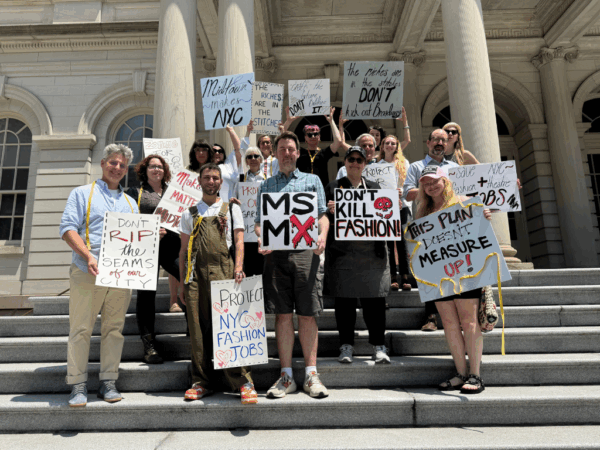
In the photograph above: Preservation advocates testify during the Midtown South Rezoning Process
HDC has serious concerns about three ballot questions that will come before voters in November that attempt to streamline the land use process in New York City by removing public voices from the process. HDC strongly supports new housing, particularly affordable housing, and believes that preservation should be seen as a tool to make that happen, especially through adaptive reuse projects and contextual development.
But these ballot initiatives are not the answer. They remove the public and even our elected officials from the decision-making processes around land use. If enacted following November’s vote, only the Mayor, relevant borough president and council member, and the City Planning Commissioners will have final say on many land use decisions. Such a decision will ultimately be to the detriment of local communities. These initiatives are proposed as furthering housing goals, but instead undermine the public review process.
The three most significant land use measures are:
Fast-tracking affordable housing (Question 2): This measure would create new procedures to speed up the approval process for publicly financed affordable housing and for housing developments in the 12 community districts that have produced the least amount of affordable housing in the last five years. This does not take into consideration how much affordable housing already exists in these areas. Additionally, this would remove the City Council’s involvement and instead allow the Board of Standards and Appeals or the City Planning Commission to grant final approval in these cases.
Expediting review for modest projects (Question 3): Known as the Expedited Land Use Review Procedure (ELURP), this proposal would create a faster review process for smaller developments and minor infrastructure projects, such as those related to flood resilience. It would significantly reduce the review time and give the final decision-making power to the City Planning Commission, removing the City Council from the final review.
Establishing an Affordable Housing Appeals Board (Question 4): This measure would create a three-member board composed of the Mayor, the City Council Speaker, and the relevant Borough President. With a two-thirds majority vote, this board could overturn a City Council decision that rejects or modifies an affordable housing project.
Key Points of Contention:
These measures have drawn criticism from some, including New York City Council leadership:
Diminished City Council Power: HDC, alongside a coalition of preservation and civic groups, argue that the proposals would undermine the democratic process by significantly reducing or eliminating the City Council’s authority over land use decisions. They contend that this centralizes power within the mayoral administration.
Increased Mayoral Control: Critics have framed the proposals as an attempt to expand mayoral power, as a newly created appeals board would include the mayor and a mayor-appointee (the City Planning Commission chair), potentially weakening the City Council’s role.
Misleading Language: Some, like City Council Speaker Adrienne Adams, have criticized the ballot language for obscuring the fact that the changes would remove the City Council’s authority from certain land use decisions.
HDC opposes these ballot initiatives that would diminish or eliminate City Council and public participation. Efforts to shut the public out of processes that shape their lives and communities follow a dangerous local and national trend of dismantling civic structures. Such decisions perpetuate the idea that only the wealthy and connected can or should make decisions about the neighborhoods that matter to us.
As we stated in our testimony before the Charter Commission in April 2025, ULURP is one of the main ways that community members and stakeholders can be involved in land use decisions. The process allows several entities to weigh in on proposals including Community Boards (advisory), the Borough President (advisory) and City Council (binding).
HDC is a longtime advocate for public processes. For more than 40 years, we have reviewed all major applications at the Landmarks Preservation Commission, because we believe community input makes our city more livable for all. We have seen time and again how public testimony has added vital information to the public record, and helped shape projects into better versions.
If these ballot initiatives are approved, it will negatively impact our involvement in major changes proposed for our neighborhoods. For example, during the public process for the Midtown South Mixed Use Plan (MSMX), HDC was among a huge outpouring of community testimony asking for changes to the plan that would protect the area’s iconic streetscapes and put in place protection for the historic garment and fashion industries.
Despite constant engagement, the City Planning Commission steadfastly refused to consider any changes, small or large, mainly because the proposed plan was created by them in the first place. Our wins were only because there were multiple entry points in the public process and several places we could help influence the outcome including in the final Council vote, where Council Member Erik Bottcher secured needed alternatives in the plan.
We urge HDC’s constituency to not support these ballot changes. Learn about the new policies on the ballot this November that would affect our abilities to voice our concerns. To read our full testimony at the Charter Revision Commission, click here.



